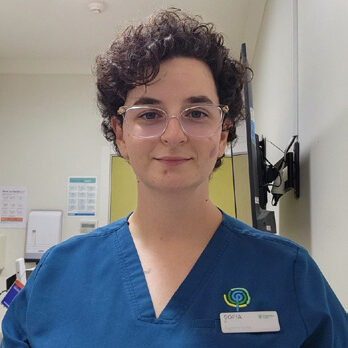
Featured articles from our Aged Care Today magazine authored by our Ageing Australia team and specialists within the aged care sector.
No matter how good we tell you it is, learners who have experienced the benefits of upskilling, can say it better.
Sofia Prodromou, Graduate Registered Nurse at Fronditha Care in Thornbury Victoria, recently completed ACCPA’s Graduate Nurse Transition to Aged Care Program.
This innovative program, offered as either a 12-month or six-month course, is for graduate Registered Nurses or graduate Enrolled Nurses in their first year of practice, or transitioning Registered Nurses who are new to the sector.
Developed in partnership with clinicians, our three transition to practice programs are designed to support nurses to become confident, safe and competent in the aged and community care sector.
Rather than tell you any more, we asked Sofia to offer a nurse learner’s perspective.
Q: Do you think the training was important?
A: The Graduate Nurse Transition to Aged Care Program was essential for my knowledge and confidence.
Often, in aged care, the work pressure is so large, that we complete tasks not always knowing, or having the time to think about, the reasoning behind them.
This program helped me unpack those tasks and provided me with the knowledge to do so during my practice.
Q: Did the training provide enough flexibility?
A: What I loved about the program was the flexibility. Since COVID-19, we have been very short staffed at work and somehow, even though Tuesdays are my designated days off, I always found myself working on a Tuesday and missing most, if not all, the live sessions.
As all the sessions were posted online, I was able to listen to the lecture on my way to and from work. For me it worked best to listen to the lectures in the car. It would put me in the ‘nursing’ zone before work and I would be excited to work and think critically about the residents. Listening to the lectures on the way back, helped me reflect on my practice and come up with ideas of things to do on my next shift.
Q: What did you enjoy the most?
A: The program kept me engaged, enthusiastic and curious about nursing. I loved being able to go to work and get the real hands-on experience, and applying my learning. It made me want to learn even more, and I’ve now enrolled myself in a postgraduate certificate in aged care.
As a result of the training, I feel more confident in my skills and myself because I have a strong learning basis. I frequently find myself discussing clinical issues with the doctors and care coordinators, something I would not even think of doing before I started the program.
Q: What about the quality of resources?
A: The materials were always very relevant to our work, giving the smaller details that we often don’t talk about or learn in nursing school. For example, learning that soaking dentures is not always good, or that nutrition plays an important role in wound healing, or more about antimicrobial stewardship.
Another example, no nursing school will teach you about aged care funding or quality indicators. Having the knowledge and understanding of how aged care operates and gets funded helped me understand what my organisation expects of me. It helped me reclassify my priorities in order to provide better care to the residents.
Q. Has it made a difference to your work?
A. I now feel confident to plan care, implement strategies and provide excellent care for my residents. My clinical coordinators and managers have shown trust in me and appreciate my hard work, they slowly allowed me to take charge of shifts when no-one else, more senior, was available.
I did my first in-charge shift six months into the course. We had an unexpected death on that shift and I handled the situation very well. The manager approached me the next day to debrief and congratulate me.
A year after starting this course, I was frequently given in-charge shifts, attending doctor’s rounds, managing the working roster, planning care and dealing with complaints or concerns from families. I never thought I would do all this, let alone only one year after starting my nursing career.
Alexandra Harrison, Information Coordinator, and Linda Baraciolli, Aged Care Today Editor and Communications Advisor, ACCPA

Reach out to your state or territory manager







Australia’s leading aged services magazine distributed quarterly featuring informative articles from service providers, suppliers, innovators and thought leaders across aged the aged care sector.
To submit story suggestions, please contact the editor.
For magazine advertising rates, please view our media kit.